

Five Steps to Build CIO Relevancy - The CIO Report. By Michael Krigsman and Lydia Segal CIOs today face a crucial choice: drive IT to become more responsive to customer needs, regardless of the difficulty, or risk losing strategic relevance.
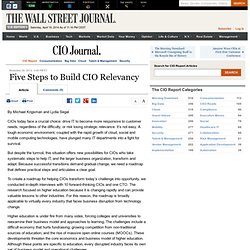
It’s not easy. A tough economic environment, coupled with the rapid growth of cloud, social and mobile computing technologies, have plunged many IT departments into a fight for survival. But despite the turmoil, this situation offers new possibilities for CIOs who take systematic steps to help IT, and the larger business organization, transform and adapt. Because successful transitions demand gradual change, we need a roadmap that defines practical steps and articulates a clear goal. To create a roadmap for helping CIOs transform today’s challenge into opportunity, we conducted in-depth interviews with 10 forward-thinking CIOs and one CTO.
Higher education is under fire from many sides, forcing colleges and universities to reexamine their business model and approaches to learning. 1. 2. The 6 Habits of True Strategic Thinkers. In the beginning, there was just you and your partners.
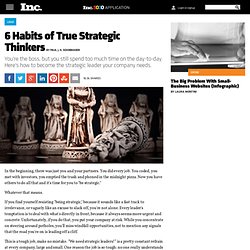
You did every job. You coded, you met with investors, you emptied the trash and phoned in the midnight pizza. Now you have others to do all that and it's time for you to "be strategic. " Whatever that means. If you find yourself resisting "being strategic," because it sounds like a fast track to irrelevance, or vaguely like an excuse to slack off, you're not alone. This is a tough job, make no mistake. After two decades of advising organizations large and small, my colleagues and I have formed a clear idea of what's required of you in this role. Anticipate Most of the focus at most companies is on what’s directly ahead.
Look for game-changing information at the periphery of your industrySearch beyond the current boundaries of your businessBuild wide external networks to help you scan the horizon better. Enhance Your Career With Leadership Skills. Scientists are called upon to show strong leadership all along the career ladder.
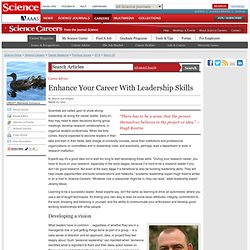
Early on, they may need to steer decisions during group meetings, develop research collaborations, or organize student conferences. When the time comes, they're expected to become leaders in their labs and then in their fields, take charge of university courses, serve their institutions and professional organizations on committees and in leadership roles, and eventually, perhaps, lead a department or even a research institution. Experts say it's a good idea not to wait too long to start developing those skills. Why College Prices Keep Rising. Courageous Leadership Skills: What Wouldn’t You Do? “Poor is the man whose pleasures depend on the permission of another.” ~ Madonna We start, unknowingly most of the time, with questions of fear: What can’t I do?
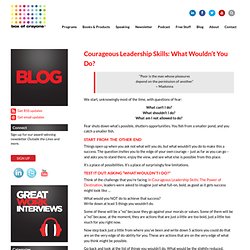
What shouldn’t I do? What am I not allowed to do? Fear shuts down what’s possible, shutters opportunities. Start from the other end Things open up when you ask not what will you do, but what wouldn’t you do to make this a success. It’s a place of possibilities. Test it out: Asking “what wouldn’t I do?” Think of the challenge that you’re facing. What would you NOT do to achieve that success? Some of these will be a “no” because they go against your morals or values. Now step back just a little from where you’ve been and write down 5 actions you could do that are on the very edge of do-ability for you. Transformational leadership skills. This year's presidential campaign in the United States has been marked by calls from President Barack Obama's would-be Republican challengers for a radical transformation of American foreign policy.
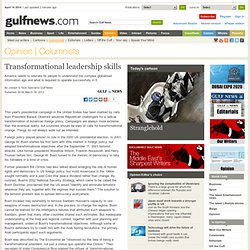
Campaigns are always more extreme than the eventual reality, but countries should be wary of calls for transformational change. Things do not always work out as intended. Foreign policy played almost no role in the 2000 US presidential election. In 2001, George W. Bush started his first term with little interest in foreign policy, but adopted transformational objectives after the September 11, 2001 terrorist attacks. Former president Bill Clinton had also talked about enlarging the role of human rights and democracy in US foreign policy, but most Americans in the 1990s sought normality and a post-Cold War peace dividend rather than change. Bush invaded Iraq ostensibly to remove Saddam Hussain's capacity to use weapons of mass destruction and, in the process, to change the regime. Leadership Skills: 5 Ways to Inspire Your Audience. Being a first generation student. Being a first generation student A look at the expectations, challenges, and opportunities March 2, 2012 Last Monday, a group of about 40 students gathered in Twenty Chimneys for a seemingly normal evening meal.
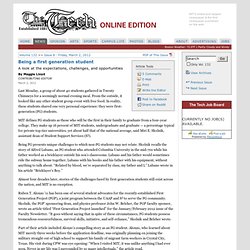
From the outside, it looked like any other student group event with free food. In reality, these students shared one very personal experience: they were first-generation (FG) students. MIT defines FG students as those who will be the first in their family to graduate from a four-year college. Being FG presents unique challenges to which non-FG students may not relate. Almost four decades later, stories of the challenges faced by first-generation students still exist across the nation, and MIT is no exception.
Ruben T. Part of their article included Alonzo’s compelling story as an FG student. After the CPW visit, he vowed to use his education to end the cycle of poverty in his family. “Ruben really inspired me,” Luis A.